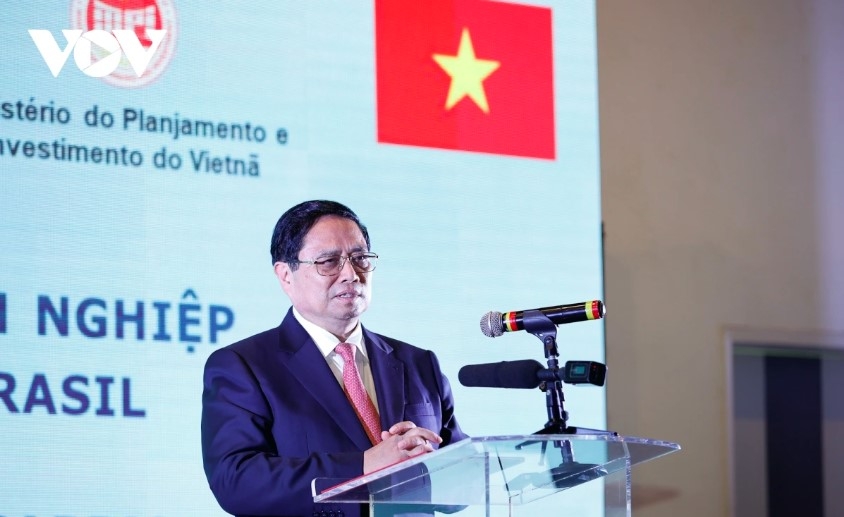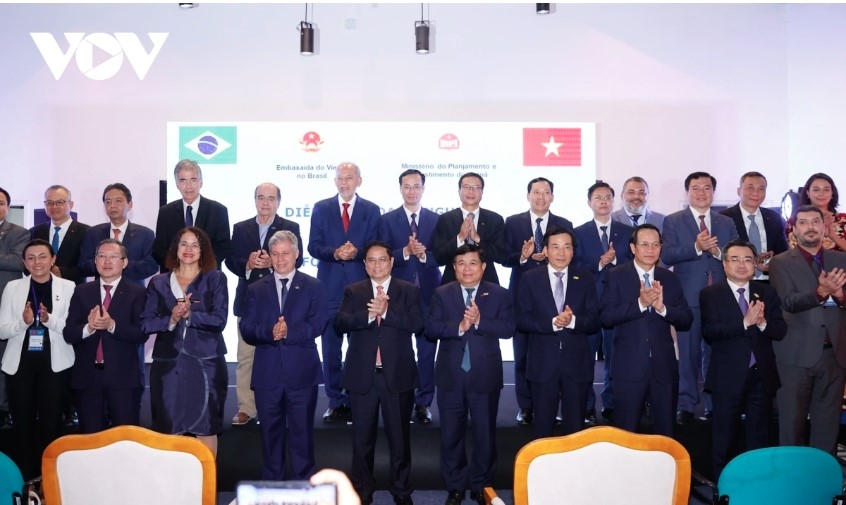PM hopes for stronger business partnership with Brazilian enterprises
Society – Economy - Ngày đăng : 09:42, 18/11/2024
Prime Minister Pham Minh Chinh attended a Vietnam-Brazil business forum in Rio de Janeiro on 17 November afternoon (local time) within the framework of his trip for attendance at the G20 Summit and bilateral activities in the Latin American nation.
At the forum, delegates and business communities of the two countries were briefed on the potential, strengths, and investment cooperation desires of each side, while solutions were proposed to promote cooperation between the two countries, especially in areas where one side has potential and strengths and the other side has demand.
Rodrigo Santiago, vice president of the Federation of Industry of Rio de Janeiro., expects the free trade agreement between Vietnam and the Southern Common Market (MERCOSUR) to be signed as soon as possible, given Vietnam's great potential, strategic position in Southeast Asia and as a bridge connecting Brazil with ASEAN.
Leaders of the Federation, the Brazilian Chamber of Commerce and Industry, and Brazilian business representatives such as the Embraer aviation group, assessed Vietnam as one of the key and important partners in Asia and said that Brazilian businesses are keen to step up cooperation with Vietnam in aviation, semiconductors, agriculture, rubber, fisheries, technology, and innovation.
In his address, Deputy General Director of Vietnam Chemical Group (Vinachem) Nguyen Huu Tu, representing Vietnamese enterprises, said that in 2024, the group's estimated trade turnover in the Brazilian market is set to reach over US$90 million, nearly double that of 2021. The group's tire and tube products under the brands of Danang Rubber and Southern Rubber have gained increasing trust from Brazilian consumers.
Brazil is an agricultural powerhouse with a huge demand for fertilizer imports. Vinachem is working with its partners to have a ship carrying tons of high-quality fertilizers and the first batches of detergents under the Vinachem brand to Brazil in 2024, Tu noted.
The Group wishes to continue to bolster cooperation with partners and customers in Brazil in the strategy for developing green chemical industrial products, in the field of digital transformation and innovation in the chemical industry and supplying technical rubber products for Embraer's modern aircraft products. In addition, it plans to import some products from Brazil such as ores, and agricultural products as production inputs to contribute to the effort to bring the two-way trade turnover between the Group and Brazilian partners to US$500 million by 2030.
Brazil sees substantial potential in collaborating with Vietnam, particularly in high-tech industries, semiconductors, agriculture, energy security, renewable energy, science and technology, climate change, digital transformation, and South-South cooperation. In particular, Brazil expects the Vietnam-Mercosur Free Trade Agreement will be signed soon, enabling Brazilian businesses to get access to the ASEAN market through Vietnam.
Brazilian Minister of Rural Development Paulo Teixeira highlighted the historical significance of Vietnam’s national liberation journey, recalling the visit of President Ho Chi Minh to Rio de Janeiro in search of a path to independence. He underlined the importance of Vietnam in the global food and foodstuff production and supply chain and stressed the need for enhanced cooperation, especially in agricultural technology, to ensure food security not just for the two countries, but also for the global fight against poverty.

In his speed, PM Chinh said that the Vietnam-Brazil relationship is continuing to see positive development, underpinned by strong political trust. In his talks with President Luiz Inácio Lula da Silva, both leaders agreed to elevate the Vietnam-Brazil relationship to a Strategic Partnership, he said, emphasizing that this will serve as a strong foundation to further intensify economic, investment, and trade cooperation between both countries' business communities.
PM Chinh underscored the strong foundation for bilateral cooperation, citing high political trust, complementary economic strengths, shared cultural values, and aspirations for peace and national development.
He showed his optimism about reaching the two-way trade goal of US$10 billion by 2025 while calling on Vietnamese and Brazilian enterprises to run investment in each other’s country, boost collaboration in agriculture and food security, renew traditional growth motives and explore new cooperation space, including aerospace and maritime development and underground spaces.
Vietnam is seeking selective investment in high-tech projects with high added value and spillover effects that can connect with domestic enterprises, he said, adding that priority is given to the domains of science technology, innovation, research and development, green economy, digital economy, circular economy, knowledge-based economy, semiconductor production, hydrogen, renewable energy, and green financing, among others.
With a view to removing roadblocks to make the economic cooperation to be on a par with the political and diplomatic relations, the Vietnamese Government leader stated that both sides should soon conduct negotiations for a free trade agreement between Vietnam and the Southern Common Market (MERCOSUR), an agreement on investment promotion and protection, and an agreement on visas and accelerate Brazil’s recognition of Vietnam’s market economy status.
To create a conducive environment for sustainable business development, Vietnam is advancing three strategic breakthroughs in institutional building, strategic infrastructure development, and high-quality human resources training while working to improve the business climate.
PM Chinh also desired for a more robust partnership between enterprises of both nations, emphasising the principles of harmonising benefits and sharing risks as well as mutual understanding, sharing visions and actions, mutual development, and shared prosperity.
Brazil is currently Vietnam's leading trading partner in Latin America. In recent years, two-way trade has grown rapidly to more than US$7.1 billion in 2023 from US$1.53 billion in 2011. During the past ten months of 2024, the figure amounted to US$6.58 billion. The two sides are aiming to increase trade to US$10 billion by 2025 and US$15 billion by 2030.
Vietnam primarily exported seafood, rubber, textiles, footwear, and steel, while Brazil’s exports to Vietnam mainly consisted of soybeans, wheat, corn, animal feed, cotton, and other raw materials to the Latin American nation.
In terms of investment, as of October 2024, Brazil had invested seven direct investment projects in Vietnam, with a total registered capital of US$ 3.85 million, mainly in the manufacturing and processing, wholesale, retail, and scientific and technological sectors.
The Southeast Asian nation has run 2 investment projects in Brazil with a total registered capital of US$700,000.

